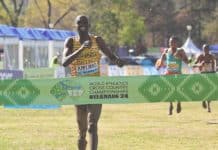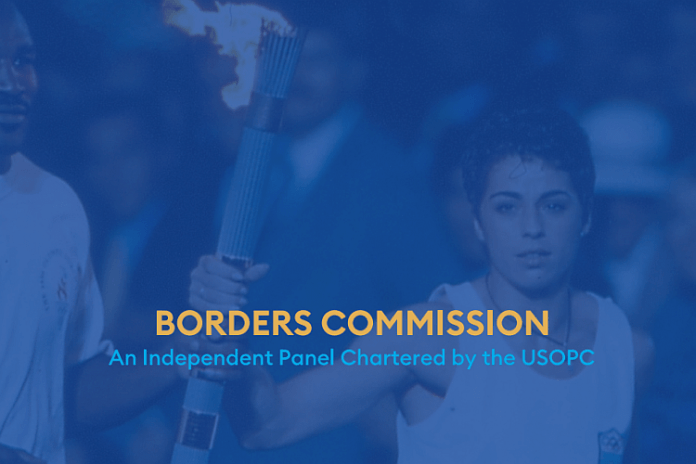The last few years have been difficult ones for the United States Olympic Committee, in the aftermath of the Larry Nassar abuse scandal in gymnastics and subsequent Congressional hearings into its conduct under the Ted Stevens Olympic and Amateur Sports Act.
But the organization is changing. It changed its name to the United States Olympic and Paralympic Committee (USOPC) and on Wednesday (17th) received the report of its “Borders Commission,” a group assembled in 2018 and requested to consider the necessary changes to make the USOPC – as now called – operational and responsive in the post-Nassar era.
As most commission reports usually do, it strongly suggested hiring more people and creating new structures to govern, manage and oversee the National Governing Bodies (NGBs) for each sport and provide an expanded set of services directly to athletes.
But it also noted, that “The Commission further recognizes that any significant source of such funds must be creatively sourced beyond the current revenue streams.” It had no suggestions on how to do that.
The Commission was chaired by Lisa Borders, a former President of the Atlanta City Council, vice president of global community affairs at The Coca-Cola Company and chief executive of the Women’s National Basketball Association. The members included four current or former Olympic-sport athletes, two representatives of the National Governing Bodies, one Independent Board Member of the USOPC and a representative of a national youth organization. The Commission had an independent outside counsel for assistance, and began its efforts last September.
The group formulated recommendations with a view to whether the suggested changes might actually work and requested interviews with 73 individuals, either directly with the Commission, or with interviewers representing it. Of these, interviews were held with 62, “many of whom had been the most vocal in their criticism of the USOPC” and 42 were current or former athletes. So the naysayers had their day, and that’s good.
What surprised the Commission was that “the information and recommendations provided by those interviewed were remarkably consistent” regardless of their position. This is also helpful.
The overarching instruction was this:
“The USOPC must assume its rightful leadership position by setting the standard for protecting athletes. A narrow view of responsibility designed to limit liability and protect reputations has no place inside the USOPC. A new mindset and behavioral paradigm at the USOPC will be required to implement the Commission’s recommendations. Now is the time for the USOPC to fully and enthusiastically embrace the role of protecting, serving and advancing elite athletes.”
The 113-page report (including exhibits) outlined five specific areas of concentration:
● Athlete Prioritization
● NGB Support and Oversight
● Organizational Accountability
● Organizational Behavior
● Congressional Oversight
The report noted that “In 2003, the USOPC radically shifted its structure to a more corporate, as opposed to representational, model. Shortly thereafter, the USOPC shifted its priorities to a more money-focused and revenue generation and distribution operation.” The Commission stated that this has to change.
On athletes, the report identified three groups which must be specifically supported: “Current Elite Athletes” now competing, “Emerging Elite Athletes” who may become world-class and “Retired Elite Athletes” who have very recently been competing at a world-class level.
These groups all deserve “support,” although the report cautions that “These various categories of Athletes need not receive the same levels of USOPC support; however, each individual within one of the groups must be viewed as an Athlete who must be protected, served and advanced at some level by the USOPC.”
Among the services to be provided are better health insurance, especially mental-health support for recently-retired athletes; education opportunities, both undergraduate and graduate, especially at universities with “pipeline” sports programs such as wrestling, track & field and swimming, and internship and job opportunities at the USOPC, the NGBs and sponsor companies.
And what about direct payments to athletes?
“Many [U.S.] Athletes are at a competitive disadvantage because of the lack of direct funding from government resources. Elite athletes from other countries often receive significant government funding. The USOPC must establish some program of baseline financial support directly to Athletes, although the Commission realizes that different categories of Athletes will receive different levels of support.”
There was no call to ask for governmental funding of the USOPC for the purpose of training athletes; also, no suggestions on how additional funding might be acquired were included in the report, or even a guess at how much additional money would be needed.
There was a long and technical review of athlete concerns over how grievances are handled and team selections are made, The recommendations were for the USOPC to take a bigger hand in these disputes, including faster resolution procedures, more athlete access to pro bono legal support, and – importantly – a change in the scheduling of selection events so that “teams be named (and challenges thereto can be brought) earlier than when the athletes’ names or provisional rosters are due to event or [Games] organizers.”
Here, the Commission was clear: medals are less important than the process. And while holding an Olympic Trials two weeks or a month earlier may or may not select the best athletes for that team, it will allow time for dispute hearings. In this suggestion, it might have been helpful to have discussed this with a coach or two. Athletes are important, but they are not all-knowing.
On governance, the report echoed the comments of Athletes Advisory Council (AAC) chair Han Xiao in his testimony to Congress in 2018 for direct funding of independent AAC staff, and to have AAC members or Athlete Councils within National Governing Bodies “ to hear and decide first-instance athlete code of conduct violations.”
There was also a makeover suggestion for the USOPC Board, for 13 members to include three athletes elected by the Athletes Advisory Council, two former athletes elected by the U.S. Olympians and Paralympians Association, three reps from the NGBs and five independent directors. By the Olympic Charter, the International Olympic Committee members in the U.S. must also be members of the Board (currently Anita DeFrantz and Kikkan Randall, both retired athletes).
The NGBs came in for extensive examination with the urgent demand that the USOPC’s system of signing agreements for athlete funding, based in part on the expected number of medals to be won in a subsequent Games be eliminated. This is the so-called “money for medals” approach which has been used by the USOPC with the NGBs in recent years.
Instead, the report projects a top-down certification and enforcement structure, with funding for NGBs (and presumably athletes within that NGB) contingent on NGB compliance with athlete safety and support requirements:
“The USOPC must go beyond only providing funds for Competing Elite Athletes and NGBs that the USOPC deems likely to win medals in the next Games. Although maintaining such medal driven programs is important, other programmatic funding and support (e.g., training and competition grants, access to Olympic Training Centers) programs must be offered to NGBs based on the USOPC’s approval of an NGB’s strategic plan and high-performance plan and its performance in accordance with such plans. …
“The USOPC should offer a suite of shared services for NGBs who opt or need to use them. The USOPC already provides some such services, but many other basic services should be provided at cost. Such optional NGB services should include support in the areas of SafeSport compliance, human resources, legal services, commercial insurance, financial and accounting, strategic planning, athlete career planning, communication, and other possible back-office services, etc. …
“Finally, each NGB, based on financial need, also should be able to apply for and receive a set stipend to help it meet its basic governance and organizational costs, especially considering its increased compliance costs. However, in each case, all funding should be subject to, and a condition of, the USOPC’s satisfactory financial audit and compliance certification of an NGB, and if there are any deficiencies, then performance in accordance with the USOPC’s corrective action plan must be invoked to remedy such deficiency.”
Again, no suggestions on where the money for these added costs comes from.
The report states additional requirements for the USOPC to manage compliance by the NGBs and itself through the creation of a Chief Compliance Officer and an aggressive set of whistleblower protections. Further, “a third party to conduct an annual assessment of its culture to monitor the progress toward a more athlete-centric one and assess how the organization’s culture is aligning with its stated mission” is needed.
Towards the end of the report, the Commission also suggested hiring more athletes as staff in order to help create an athlete-centered culture and noted that “When an organization’s diversity closely matches those served by the organization, service levels and operational performance improve. The unique experiences and challenges faced by different groups should be considered in hiring decisions. The Commission is not proposing quotas of any description, but rather an intentional effort to include diverse, qualified candidates in hiring pools. An organization that does not look like its primary constituent group is making inadequately informed and suboptimal business decisions.”
This Olympic version of the NFL’s “Rooney Rule” on the hiring of head coaches did not provide any indication of what the USOPC’s “primary constituent group” looks like, but it obviously thinks the USOC staff are not it. The report further takes a thinly-veiled shot at the demographics of Colorado – where the USOPC is headquartered, and which is 84.2% white – noting that “the location of an office impacts the ability to attract diverse candidates. The Commission encourages the USOPC to consider appropriate uses of technology to help mitigate self-imposed location challenges.” Translation: USOPC staff shouldn’t have to live in Colorado.
There is an extensive set of language changes to the Ted Stevens Olympic and Amateur Sports Act to enshrine these changes in attitude and responsibilities, along with a well-done timetable of changes required and timing.
In its conclusion, the report noted:
“The Commission recognizes the limitations of the USOPC’s current abilities and funding and acknowledges that there simply are not nearly enough resources for the USOPC to fully oversee all amateur sport in the United States. That said, the USOPC does have an opportunity to reflect and self-evaluate in real-time. In fact, in the face of difficult circumstances, it is not only possible for the organization to continue to evolve and improve, but a negative situation actually compels the organization to change in order to survive and ultimately thrive again.”
Great, just great.
There is a lot of good advice in the report, and many of its recommendations will be implemented. But the simple call for more services without more revenue to support it inevitably dooms the Commission’s project to failure in at least some aspects.
Changing the USOPC Board composition and insisting on a better dispute-resolution process will help. But the real answer to the U.S. Olympic Movement’s situation is to do something incredibly difficult: find a transformative leader who can not only bring the USOPC and the NGBs to a better place, but share a vision of positive values and success attractive to all Americans, both individual and corporate.
Let’s hope that Sarah Hirshland – who comes from a marketing and sales background – is that person. If not, all of these reforms will only make the USOPC a prime subject for future doctoral dissertations on the process of changing non-profit governance. And that has very little to do with athletes.
Rich Perelman
Editor




















